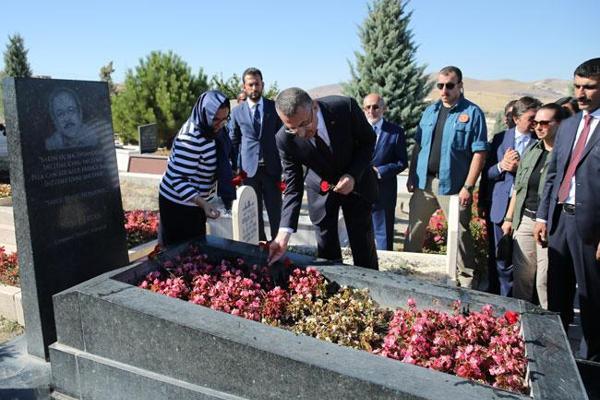Turkey's legendary folk singer Neşet Ertaş commemorated
KIRŞEHİR - Anadolu Agency


Six years after his death folksinger Neşet Ertaş remains etched in the hearts of his fans.
To commemorate his death anniversary on Sept. 25 several events have been organized across the country.
He died in 2012 in the western province of İzmir at the age of 74 after a battle with cancer.
Fans of the singer and lyricists are paying tribute to him at his mausoleum in the Central Anatolian province of Kırşehir.
Ertaş was born in the Çiçekdağı district of Kırşehir in 1938.
He played the bağlama, a traditional Turkish stringed musical instrument.
Fondly remembered as the “Bozkırın Tezenesi” (Voice of Prairie), “Türkülerin Babası” (Father of Songs), “Anadolu Efsanesi” (Legend of Anatolia), and Abdal Müzisyen (Abdal Musician), Ertaş is seen as the last great proponent of a genre called “Abdallık” — a name referred to groups dealing with music in his hometown.
In 1957, Ertaş went to Istanbul, where his first record — titled “Neden Garip Garip Ötersin Bülbül” — was produced.
After working for two years in Istanbul, he moved to Ankara, where he met his wife Leyla. They married despite his father’s opposition. The couple has three children.
In 1978, Ertaş moved to Germany to receive treatment after his fingers became paralyzed. In 2000, he returned to Istanbul to perform at a concert.
UNESCO recognized Ertaş as a living human treasure. The folk singer refused the state artist title, which was offered by then President Süleyman Demirel.
Ertaş was awarded an honorary doctorate by Istanbul Technical University Turkish Music State Conservatory in 2011.
Erol Parlak, professor at Ankara Music and Arts University, published two volumes — titled “Garip Bülbül Neşet Ertaş — on Ertaş’s biography and songs.
His famous songs are “Yalan Dünya,” “Vay Vay Dünya,” “Kırşehir’in Gülleri,” “Neredesin Sen,” “Gönül Dağı,” “Mühür Gözlüm,” “Zülüf Dökülmüş Yüze,” “Yaraladı Bu Aşk Beni,” “Yolcu,” “İki Büyük Nimetim Var,” “Hapishanelere Güneş Doğmuyor,” “Evvelim Sen Oldun, Ahirim Sensin,” “Seher Vakti,” “Aşkın Beni Deli Eyledi,” “Deli Boran,” “Dertli Yoldaş,” and “Dinek Dağı.”
